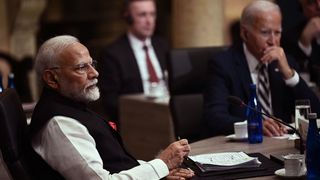With Saturday’s Quad Leaders' Summit, India's role in the partnership is back in focus. Hosted in Delaware, this fourth Leaders’ Summit in four years comes during a highly political and contested time – being post Indian Prime Minister Narendra Modi’s re-election and his recent visits to both Russia and Ukraine, and pre the US election.
Modi has the greatest longevity of all four Quad leaders, attending all four Summits – affording him greater credibility and strength in discussions. But despite Modi’s dedication, India has been at the centre of various debates about its role in the Quad.
Having made its commitment to strategic autonomy clear, New Delhi has navigated between cooperation and caution in several areas of the partnership since it revived in 2017. On the one hand, India resisted the tendency to cast the partnership as a hard security alliance or one focussed solely on countering China’s assertive behaviour in the Indo-Pacific. On the other, the omission of naming Russia’s for its aggression in Ukraine in the previous statements – often linked to New Delhi’s relationship with Moscow – has raised questions about the effectiveness of the Quad.
This balancing act will be in sharp focus, as Modi, along with his counterparts, outline the next steps for the partnership.
While there are asymmetries in the capabilities and resources among the Quad countries that complicate cooperation, their shared interests strengthen the effectiveness of the partnership. For India – a rising but still developing country – the engagement is predominantly driven by the strategic needs of development and becoming a regional leader.
The Quad is an ambitious group, with a focus on six key areas – climate change, critical and emerging technology, cyber, health security, infrastructure and space. Together, these provide strategic direction to the Quad’s engagements in the Indo-Pacific. While there are asymmetries in the capabilities and resources among the Quad countries that complicate cooperation, their shared interests strengthen the effectiveness of the partnership. For India – a rising but still developing country – the engagement is predominantly driven by the strategic needs of development and becoming a regional leader.
While it has its critics, far from being the weak link, India is strengthening the partnership. Modi is standing up for territorial integrity, focused on delivering public goods to the region, and investing in development cooperation. Plus, India is positioning itself as an alternative ‘voice of the Global South’ to China. All these qualities make India an extremely valuable and strong member of the Quad.
First, India's emphasis on territorial integrity and sovereignty in the Indo-Pacific is a cornerstone of its collaboration with Quad partners. China's expanding presence in India's land and maritime neighbourhood, coupled with the ongoing border standoff, has significantly heightened India's threat perceptions. While hard security measures are crucial for defending its northern border, China’s strategy—through projects like the China-Pakistan Economic Corridor, port developments in Sri Lanka and Bangladesh, and growing influence in Nepal and Bhutan—seems aimed at encircling India within its own region.
The Quad’s focus on a ‘free and open Indo-Pacific’ aligns with India's efforts to counterbalance China’s encirclement strategy. By viewing security through the lens of its own vulnerabilities, New Delhi highlights the evolving, non-traditional threats in the region, ultimately broadening the Quad’s understanding of security and strengthening its collective approach to working with countries in the region.
Second, India’s emphasis on the delivery of public goods through the Quad resonates with the needs of the smaller countries in the region. By focussing on areas such as critical and emerging technology cooperation, leading discussions on climate-resilient infrastructure, and strengthening health security, India seeks to solidify its position as a norm-shaper in the Indo-Pacific region.
As India seeks legitimacy and effectiveness in the Indo-Pacific as a development partner, it’s approach only strengthens the group’s overall impact.
These efforts are particularly significant in the Indian Ocean Region, where India’s influence is strong. These efforts while aligning with India’s own efforts of becoming a Vishwa Bandhu (Global Friend) and a Vishwa Guru (Global Teacher), also supports the Quad’s efforts in agenda setting on key sectors and position itself as a responsible grouping.
Finally,through its extensive development cooperation, India has positioned itself as a partner of choice for the countries in the region. By prioritising programs focused on community-level developments and engagements with a focus health, education, capacity building and trainings, supported through grants and concessional credit, India has found success in executing high impact projects in its neighbourhood.
By bringing this work into the Quad, particularly through training in infrastructure development, India is leveraging its position not just as a provider in the Indo-Pacific region, but also bolstering the legitimacy of the Quad. By engaging with Quad partners like the US, Australia, and Japan, as well as like-minded nations such as South Korea, India helps position the Quad as a platform for regional cooperation and development.
New Delhi participation shows a growing confidence in the Quad. It seeks to leverage the Quad’s flexibility to achieve tangible outcomes through a careful balancing its national interests with broader regional goals. This is not very different from the interests of its Quad partners.
As India seeks legitimacy and effectiveness in the Indo-Pacific as a development partner, it’s approach only strengthens the group’s overall impact.A weakened Quad holds no strategic value to India.






